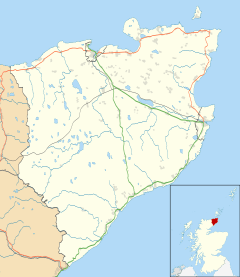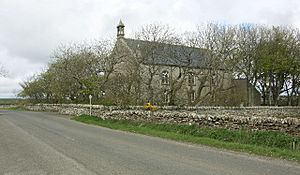Bower, Highland facts for kids
Quick facts for kids Bower |
|
|---|---|
| Population | 633 (2011 census) |
| OS grid reference | ND2360 |
| Council area | |
| Country | Scotland |
| Sovereign state | United Kingdom |
| Police | Northern |
| Fire | Highlands and Islands |
| Ambulance | Scottish |
| EU Parliament | Scotland |
Bower (Scottish Gaelic: Bàgair) is a village and civil parish in the Highland area of Scotland. It is located about 10 miles from Thurso and around 11 miles from Wick. Residents of Bower often visit Wick, Thurso, or Castletown for shopping, taxis, and post office services.
In 1851, Bower had a population of 1,845 people. However, by 2011, this number had changed to 633.
The village area known as Bowermadden includes two streets: Auchorn Square and Thura Place. You can also find many scattered houses and farms throughout the area.
Contents
Learning in Bower
Early Years Education
Bower Busy Bees offers early education for young children. This includes kids aged 2.5 to 5 years old. Bower Busy Bees is located behind the Bower Community Centre. It is in renovated stables and has a great outdoor play area and garden.
Primary School
Bower Primary School was first built in 1976. It was later moved to its current location in the village. The school's motto is 'Small School, Big Education'. This shows their focus on providing a strong learning experience.
High School Choices
After primary school, students from Bower attend high school. They typically go to either Wick High School or Thurso High School.
Businesses and Jobs
Bower is home to several local businesses. These companies provide jobs and services to the community.
Local Companies
Norscot Joinery Ltd. is a company that makes windows, doors, and builds houses. You can find it on the main B876 road that runs through the village. Further along, you'll find the former Nicolson Engineering works. These buildings are now rented out to different companies for storage and other activities. This area grew from an old blacksmith's forge. The nearby cottage is still called The Smiddy.
Other Local Businesses
Bower also has other independent businesses. These include Flower Daze, a florist, and CoCo Chocolatier, which makes chocolates. Lee Mackay, a joiner, also works out of the village. Many farms and smallholdings are also based in Bower.
Ancient Standing Stones
The Stone Lud
One of Bower's most interesting historical features is The Stone Lud. This is a tall standing stone located in Upper Bower. Some people believe this stone might be the grave marker of Ljot Thorfinnsson. He was an earl of Orkney who lived in the 10th century.
However, The Stone Lud is about 3 metres (9.8 feet) tall. This height seems much taller than the grave markers used by the Norse people in the 10th century. It is one of the most impressive standing stones in Caithness. Its size and weight are similar to the stones at the Ring of Brodgar in Orkney.
Two Stones Together
The Stone Lud is actually one of two stones. The second stone has now fallen over. It is about 30 metres (98 feet) away from The Stone Lud. When the second stone was standing, it was thought to be behind the first. This alignment was seen from the direction of the summer solstice sunset in the northern hemisphere.
Stone Alignments
In a book from 2003, Leslie J Myatt described the alignment of the stones as 322 degrees. This is measured from the fallen stone to the standing Stone Lud. This alignment might suggest a summer solstice sunset that is quite far north for this area. However, the stones are located at a high altitude of about 75 metres (246 feet). This allows for a clear view of the Atlantic horizon in that direction.
The sunset alignment of these stones is different from Maeshowe. Maeshowe is an ancient chambered tomb in Orkney. It was built so that sunlight would shine into the tomb during the winter solstice sunset.
The Name's Mystery
The name Ljot is very similar to Lot or Loth. He was a mythical king of Orkney and Lothian in the Arthurian legend. In a book from 1912, Charles Squire suggested that Lot was a later version of an ancient British god. This god is remembered in old Welsh legends as Lludd Llaw Eraint. However, modern experts are more cautious about this connection.
 | Calvin Brent |
 | Walter T. Bailey |
 | Martha Cassell Thompson |
 | Alberta Jeannette Cassell |



